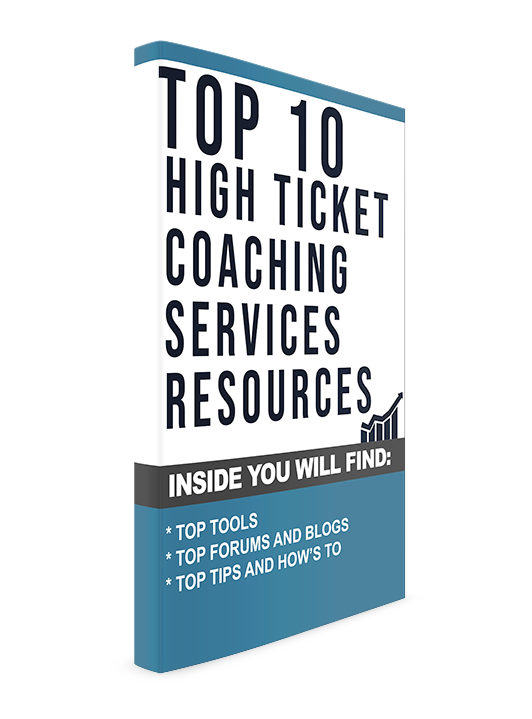The professional coaching industry is booming, with more people seeking guidance to achieve personal and career goals. However, this high demand also means increased competition. For coaches, standing out and attracting potential clients requires a solid and well-executed marketing strategy. This guide explores the most effective marketing strategies for professional coaches, from building a personal brand to engaging clients through social media and content marketing.
1. Define Your Coaching Niche
One of the keys to successful marketing in the coaching world is specialization. Defining a niche allows you to connect more deeply with your audience and establish yourself as an expert in a specific area. Whether it’s life coaching, executive coaching, career coaching, or health coaching, clients seek someone who understands their unique needs.

100% FREE REPORT!
"Get Instant Access To My Top 10 Coaching Resources To Kick-Start Your Coaching Business"
Simply enter your email below so we know where to send it...
Benefits of Specializing
- Increases visibility in specific market segments.
- Builds trust with potential clients looking for an expert.
- Simplifies content creation by focusing on targeted and relevant topics.
Tip: When defining your niche, consider the specific problems you solve. Creating a list of frequently asked questions from clients and focusing your content on addressing those needs can help you attract more attention.
2. Build an Authentic Personal Brand
Your personal brand is what makes you unique and memorable. In coaching, personal branding is crucial, as clients look for someone they can trust and rely on. Focus on communicating who you are, your values, and what motivates you to help others.
Key Elements of a Personal Brand
- Mission and values: Convey what drives you and what principles you stand by.
- Visual identity: Use colors, typography, and design elements that represent your professional approach.
- Voice tone: Define how you speak and write, keeping it consistent across all communications.
Tip: Leverage storytelling. Share your background story and personal experiences that led you to become a coach. This humanizes your brand and helps your audience connect with you.
3. Optimize Your Social Media Presence
Social media is a powerful marketing channel for coaches. It allows you to promote your services and engage directly with your audience. Here are some effective strategies for major social media platforms.
Social Media Strategies
- Instagram: Share client testimonials, motivational quotes, and advice videos. Use stories and reels to connect in real-time.
- LinkedIn: Ideal for executive or career coaches. Publish articles, share testimonials, and success stories. Join discussion groups and professional networks.
- YouTube: Create short videos answering common questions or diving deep into specific topics. Tutorial and advice videos are highly sought after on this platform.
Tip: Don’t try to be on every platform. Identify the networks where your audience is most active and focus on generating quality content for those areas.
4. Leverage Content Marketing to Attract Clients
Content marketing helps you position yourself as an expert by providing valuable information. Potential clients tend to trust coaches who share practical knowledge freely. Creating relevant content in different formats will help attract traffic and keep your audience engaged.
Effective Content Types for Coaches
- Blog posts about common topics within your coaching niche.
- Podcast episodes discussing personal development, inspirational stories, or success case studies.
- Ebooks or free guides that users can download in exchange for signing up to your email list.
Tip: Use relevant SEO keywords in your blog posts to improve your Google ranking. This makes it easier for potential clients to find your content and become interested in your services.

5. Develop an Email Marketing Strategy
Email marketing is one of the most effective and personalized strategies for coaches. By building a contact list, you can send valuable content regularly and keep your brand on your subscribers’ minds. Email marketing is also great for sharing testimonials, promotions, and new offerings.
Tips for a Successful Email Strategy
- Segment your content: Send personalized emails based on each client group’s needs.
- Offer free subscriptions with exclusive content. This could be a series of tips, a workout guide, or weekly reflections.
- Automate your campaigns to send reminders and maintain consistency.
Tip: Use tools like Mailchimp or ConvertKit to create automated email flows, which will save time and improve the effectiveness of your marketing.
6. Utilize Digital Advertising Strategies
Investing in digital advertising can help accelerate the growth of your client base. Platforms like Google Ads and Facebook Ads allow you to segment your audience by interests, demographics, and behavior. These campaigns can help you reach a broader audience who may be interested in your coaching services.
Advertising on Google and Social Media
- Google Ads: Ideal for capturing potential clients who are already searching for terms related to coaching.
- Facebook and Instagram Ads: Use visual ads with inspiring quotes and clear calls to action.
Tip: Start with small campaigns and measure the results before scaling up. Experiment with different formats and messages to see what resonates best with your audience.
7. Encourage Testimonials and Success Stories
Client testimonials are a powerful marketing tool for coaches. Reviews from satisfied clients create trust and credibility in your service. Ask for testimonials after each coaching process and share them on your website, social media, and other promotional materials.
How to Request Testimonials
- Ask directly: After a successful session, ask the client for feedback and allow them to share their experience.
- Make it easy: Provide a structure to guide the client on what aspects to highlight in their testimonial (for example: initial challenges, achieved results, and general experience).
Tip: Video testimonials are impactful, as they convey emotions and make it easier for other clients to connect.
8. Track and Optimize Your Marketing Results
Finally, no marketing strategy is complete without a process of analysis and optimization. Track your actions’ performance and adjust your campaigns based on the results.
Key Metrics for Coaches
- Conversion rate: How many visitors turn into clients?
- Social media engagement: Which content gets the most interaction?
- Email open rate: How many of your subscribers read your emails?
Tip: Use Google Analytics and each social network’s tools to get detailed reports on your posts’ and campaigns’ performance.
Conclusion
Developing a solid marketing strategy is essential for any professional coach looking to stand out in a competitive market. From building a personal brand to leveraging social media and content marketing, each step helps establish a strong online presence and gain potential clients’ trust. Remember that consistency is key: a continuous focus on your marketing will help attract and retain clients over time.
